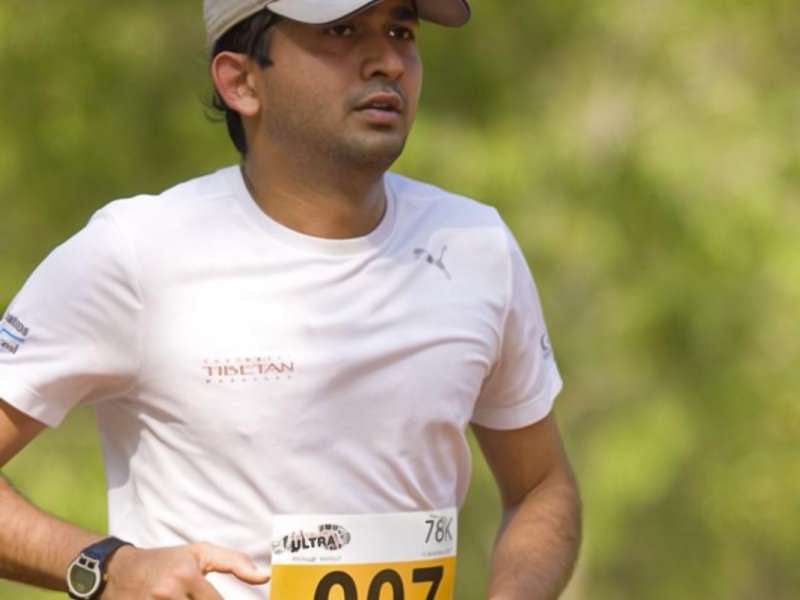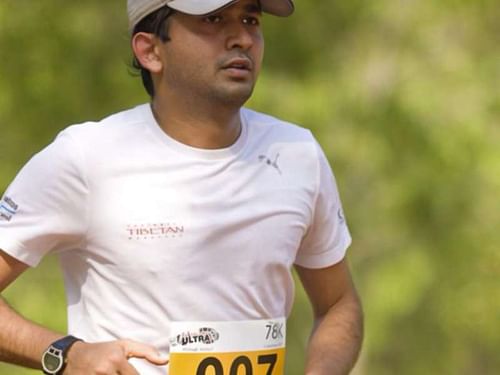
Endurance Man Girish Mallya speaks: "You can't expect instant results from running"
How did you get into running and how long have you been doing it? Can you please elaborate on your transition and progress from one stage of running to another?
I have always enjoyed running since childhood, and have been running since the age of 15, I was doing 3-5k runs three times a week on a jogging track in Colaba Woods (Bombay), that is my earliest recollection of running. I made the transition to marathons about a year before the first edition of Bombay marathon in 2002, I started off with training for my first full marathon.
Those days there were very few formal long distances races in India, which were open to enthusiast/general public. And I have been running all editions of full marathon at SCMM since then. I moved to adventure marathons in 2007 with the great Tibetan marathon in Ladakh, followed by the first edition of Bangalore ultra (my 1st ultra marathon of 78km) in 2008.
I moved to multi stage ultra-marathons in 2012 with the Kerala Ultra (200km self-sustaining race, over 5 days), this was more of a preparatory race for the biggest race of my life the Marathon Des Sables (MDS) which took place in 2013 (250km self-sustaining race over 6 days across the Sahara Desert). And more recently since 2014 I have started doing triathlons.
Tell us about your experience at the Ironman Triathlon in 2014. What did you learn from it?
The Lankawi Ironman Triathlon 2014 was a huge learning experience for me, it was my first DNF (Did not finish race).
I had done an Olympic triathlon and Half Ironman in India, as preparation for the race in 2013 and 2014, but that was just not enough. I went wrong on a whole host of things with my planning and preparation for the race, the key ones; where I had done only two short sea swims (and never with currents) before my ironman race (all my training and experience was in a pool or lake) so I ended up expending more than required energy to complete my swim leg within the cut-off.
The second big mistake was having trained for cycling purely on flat ground (no hill training or long hours of training on a cycling trainer), I assumed Langkawi would be flat as it was an island and ever imagined (till race day) that it would have some of the most gruelling hills (and two loops of those).
These two big mistakes cost me my bike leg and the race. Also my strength is endurance, stamina and mental toughness and not speed. So I have to put in a disproportionate effort and train for extra hours to meet stiff time cut off for races like Ironman, and these are difficult to manage given a demanding schedule as a magazine publisher.
As a veteran runner, what would you say are the mental benefits of running, besides the physical ones?
I don't run as a form of exercise, I run purely for pleasure. Even something as trying to run fast or hard, takes away from the pleasure of running. Running is a cure all for me, it helps me clear my head after a hard day of work, it relaxes me and calms me down when I am angry. It makes me feel positive and invincible when faced with any adversity. I actually have withdrawals symptoms if I not run for more than a week.
I take care to ensure that I have a moderate weekly mileage of around 40-50km per week, round the year. This is to ensure that I can continue running all my life, by giving my body the required respect and not pushing it beyond limits, on a continuous basis.
In today’s hectic lifestyle schedule, lack of motivation becomes a huge roadblock to incorporating running in one’s daily regimen. How does one overcome that?
Fortunately, running comes easy to me, it’s not an effort or 'exercise routine' for me, so I never suffer from motivation pangs. But for most others it can be quite an effort and they need to find ways to include it in their lifestyle to make it a permanent feature of their life.
Running with a group, with your run buddies is the best way to find motivation. Another big tool is to register for races at regular intervals, that is one of the best way to ensure that you are regular with your training runs.
The second would be to reduce hurdles which make running an effort, eg - if you are not a morning person, don't force your body to go for morning runs, shift them to the evenings, and if you are traveling on work, do your run on treadmill and always carry your running shoes with you when traveling. Find simple hacks to make running simple (and finding time for it) and not an effort.
What should be the ideal age for starting to run marathons? What would be your valuable tips for first-timers?
There is no ideal age to start running, running comes naturally to humans. We need to run and focus on more 5 and 10k races instead of marathons, and increase the distance in a very gradual manner, over many months.
Some of my favourite tips - stop obsessing about timing when running (just track and log it for measuring long term improvement), run within yourself (don't try to compete all the time, run at your pace and within your HR zone), follow a scientific training program, and if you can afford it please take the help of a certified running coach or join a running group which has experience runners and certified trainers attached to it.
It is said that it is never too old to run. However, keeping in mind the body degeneration post 40, how do older people start approaching this sport and what precautions do they need to follow?
I do genuinely believe that it’s never too old to run, and I hope to prove that by running till my very last day. First things first, all working professional who want to take up running and have not lead a healthy lifestyle need a complete body health check-up, including the cardiac check.
They need to be less competitive (for bragging rights on social media and at work) and focus more on enjoying the sport (in this case, running). They need to make running a part of their routine (with the help of a running group and trained coach). Other than this there is nothing stopping people of any age from taking up running.
In your blog, you have talked about running injury management. How does one manage to make a fine balance between the right amount of training and rest?
There is no way to avoid occasional running injuries, even after taking all possible precautions. Our body is not perfect and can be unpredictable, plus there are a lot of external factors which play a part in it. But that does not mean we stop taking precautions and minimizing the probability of injuries and ensuring that one does not encounter any serious running injuries.
My recommendation is to run moderate distances (weekly mileage) depending on your body and training level, and always supplement it with strength training or cross training. And always respect your body, sleep and rest is extremely important for your body's recovery process, never compromise on it.
Why do you think India is still lagging behind in terms of awareness about running? What can be done to make it a more popular sport?
I do not actually believe that is true, running has been growing at an explosive pace in India, over the last few years. My worry is different, most new runners want to register and run a half/full marathon in 2 or 3months time, they want instant results and the peer pressure just adds to it.
Another concern area with proliferation of races (we now have almost one race a week in some or the other locality of Bombay) is the need for certification, to ensure basic quality and service maintained across all (especially emergency care), and finally we need to have more 5-10k races to encourage new runners, through formal and informal groups, on the lines of initiatives like Ignite your City (IYC) by PUMA, to get more new runners into the sport and taking them through the paces by giving them an opportunity to run, train and learn from experienced runners in their locality and city.
